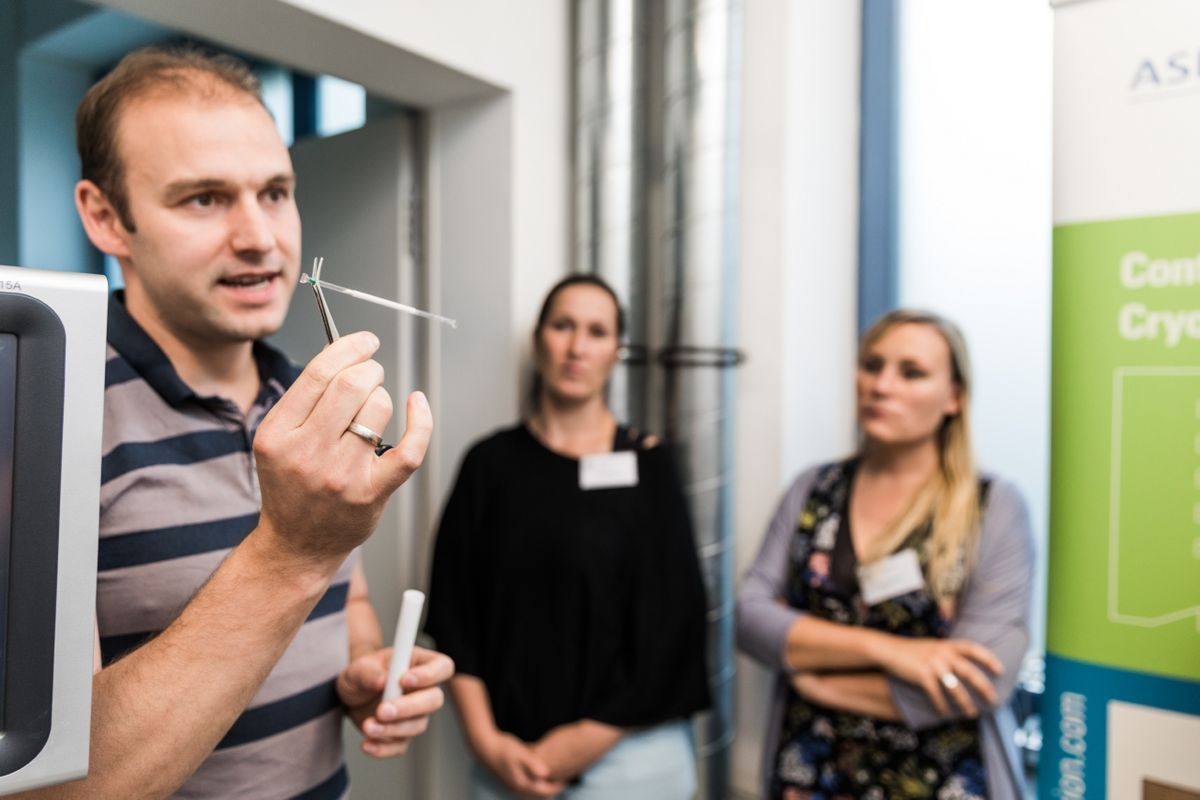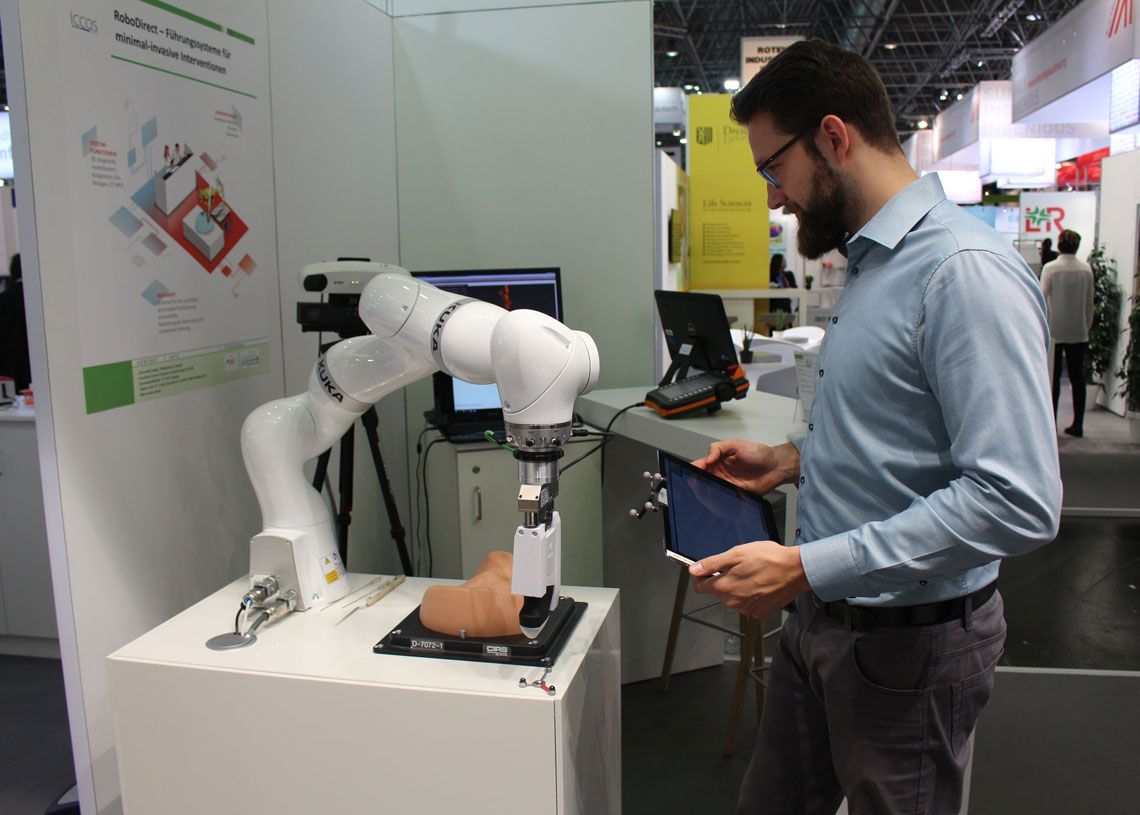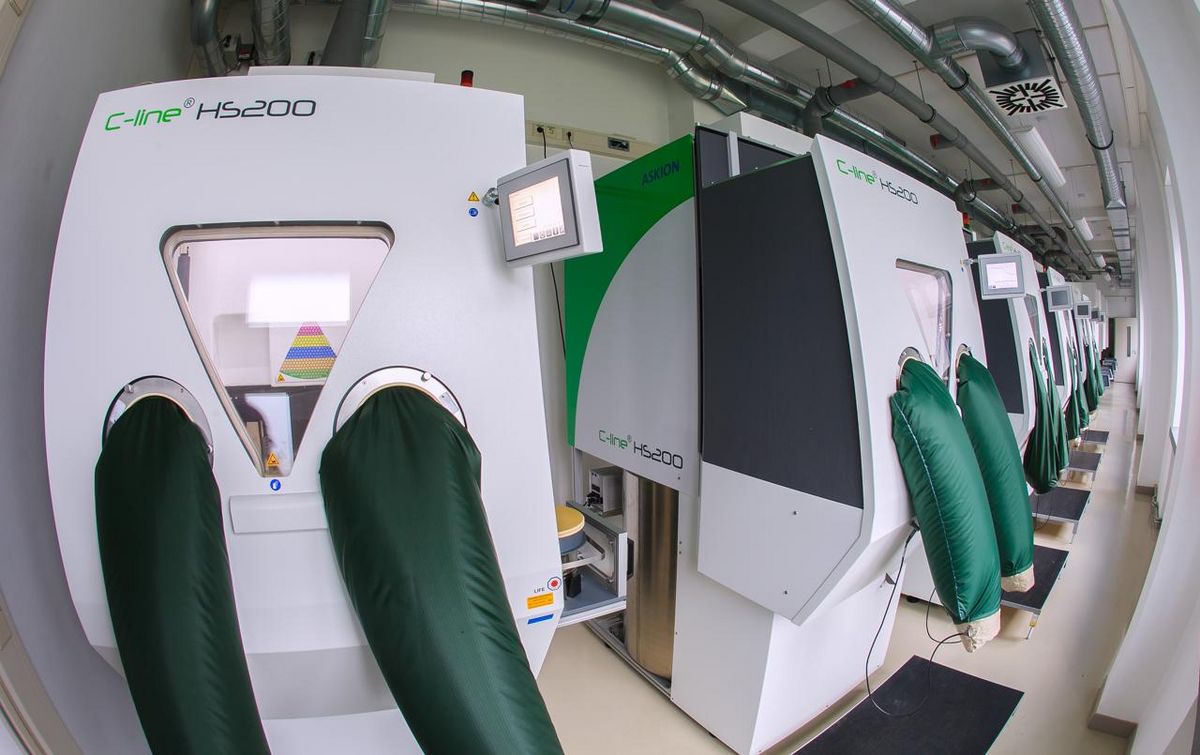Would you like to find out more about the research and technology and knowledge transfer services at Leipzig University? There are various ways to get in touch with our researchers. At trade fairs, we present selected close-to-market products, innovative services and promising visions for the future. Our TransferMeetings format lets you learn more about outstanding projects and specific opportunities for investment in our research areas.
Would you like to find out more about our research spectrum and partnership opportunities? Then don’t hesitate to get in touch with us. We can provide consulting on a wide range of topics and offer you the opportunity to take part in individual events so that you can get to know more about selected areas of Leipzig University that match up with your interests.
TransferMeeting
TransferMeetings is the name given to a series of events at Leipzig designed to deepen and expand the dialogue between researchers from the University and companies in the region.
Building on existing business contacts, we want to develop new projects and establish new contacts in the form of network structures. To this end, researchers from various disciplines invite entrepreneurs and multipliers as special guests to their laboratories and institutes. On site, they present their areas of research, current problem-solving approaches and opportunities for industry in the region to work with the University. In addition, the research areas as well as Continuing Education and the Career Service at Leipzig University present industry-specific offers and opportunities for cooperation.
ARTIFICIAL INTELLIGENCE is Reality
An event in our TransferMeeting series on the theme “ARTIFICIAL INTELLIGENCE is reality – Machine learning in the context of medical applications and the latest CYBERSECURITY” took place on Wednesday, 6 November 2019 in the Logistics Living Lab of the Faculty of Economics and Management Science.
The speakers were our leading researchers in the field of artificial intelligence, Professor Gerhard Brewka, one of the ten leading minds in AI research in Germany, and Professor Martin Bogdan, together with their scientific teams.
Professor Brewka gave a brief overview of current research areas such as non-classical inference methods, answer set programming and argumentation. Afterwards, Professor Bogdan explained the difference between artificial intelligence and machine learning, and introduced a number of highly interesting application areas including:
- Nerve-controlled prosthetics
- Brain-computer interfaces
- Rehabilitation for stroke patients
- Mainframe workload forecasts
- Sketching yield predictions in semiconductor manufacturing
This was followed by a practical demonstration on selected research topics:
- Controlling a prosthesis using information from peripheral nerves represented by electromyographic (EMG) signals
- Detecting consciousness in patients with completely locked-in syndrome (CLIS) using EEG recordings to initialize communication attempts via brain-computer interface (BCI)
- Identification and legally sound verification of hacker attacks with the aid of machine learning using internal computer parameters (EXPLOIDS project)
A subsequent get-together with our researchers provided an opportunity to discuss any potential partnerships.
Previous Meetings
- 7. TransferMeeting on lifestyle diseases – LIFE data and samples for research and innovation
- 6. TransferMeeting on biosensors – new developments in diagnostics and bioanalytics
- 5. TransferMeeting on big data and data integration: management and analysis of large data volumes
- 4. TransferMeeting on “knowledge creating practice” and “practice creating knowledge”: interactions and synergies between the public and private sector
- 3. TransferMeeting on movement, health and performance
- 2. TransferMeeting on new materials: thin films – manufacture, quality assurance and practical application
- 1. TransferMeeting on medical logistics: the optimisation of logistical processes as a basis for cost reduction and increased product safety in the medical and medical technology sector
Technology Fairs
Our University supports innovative researchers who would like to present close-to-market research results at technology fairs. The aim is to establish contact with potential research and industry partners.
The Knowledge and Technology Transfer Section is the point of contact for all researchers at Leipzig University who would like to present their research results at technology fairs.
Stands at trade fairs for all higher education institutions in Saxony are organised by the “Forschungsland Sachsen” working group under the auspices of the Technische Universität Dresden. The activities of this working group are partly financed by the Saxon State Ministry of Science and the Arts (SMWK).
The exhibits selected are presented at the stands run by the “Forschung für die Zukunft” working group, which is an initiative of the federal states of Saxony, Saxony-Anhalt and Thuringia to support higher education institutions, research institutions and their partners.
Upcoming Fairs
Due to the coronavirus our University presents the exhibits exclusively at virtual trade fairs:
Selected Exhibits
We select only close-to-market research results to present at technology fairs. The focus is on prototypes of innovative technical solutions, ready-to-use services, innovative software solutions and consulting services. The following provides an overview of particularly successful trade fair presentations:
RoboDirect – Guidance Systems for Minimally Invasive Interventions (MEDICA, Düsseldorf, 13–16 November 2017)
The Innovation Center Computer Assisted Surgery (ICCAS) of the Faculty of Medicine at Leipzig University worked together to develop RoboDirect, a model-based robotic system for treatment procedures. RoboDirect is designed to support surgeons in conducting minimally invasive procedures. For example, interventional radiology procedures such as biopsies and puncturing tissue structures benefit from the high positioning accuracy of the robotic system. The combination of an optical tracking system with a robotic arm enables the exact positioning of medical devices. Using an augmented reality-based tablet app, patient-specific reconstructed 3D models can be referenced and target structures marked. The robotic arm controls the defined positions and provides a guiding system for the needle feed. The additional integration of an ultrasound probe makes it possible to check the needle position in the tissue. This prevents repeated insertion of the needle when the target is missed. In the long term, the aim is to reduce the burden on the patient and surgeon as well as to increase precision and efficiency. In the near future, systems such as RoboDirect will be used routinely for tissue punctures, biopsies and ablations.
Contact
Leipzig University
Faculty of Medicine
Innovation Center Computer Assisted Surgery (ICCAS)
Semmelweisstraße 14, Building14
04103 Leipzig
+49 341 97-12000
Biobank and Biomarker Profiling in Large Cohorts of Children and Adults (analytica, Munich, 10–13 April 2018)
The Leipzig Research Centre for Civilization Diseases (LIFE) focuses on widespread diseases such as depression, diabetes, allergies and atherosclerosis. To this end, more than 25,000 participants have been included in the study since 2010 and have taken part in interviews, questionnaires and physical examinations. More than 1 million biosamples (e.g. blood and urine) of the participants have undergone laboratory testing and been cryogenically preserved in our Biobank. These samples were analysed using established clinical and laboratory analysis methods in a medical laboratory accredited according to ISO DIN 15189 and 17025 on the day of sampling (80 parameters). In addition, a newly developed, validated mass spectrometric platform for metabolom and proteom analysis (e.g. bioactive lipids and apolipoproteins) was used to quantify deep-frozen biomaterial (a total of approx. 300 biomarkers). Thanks to the extensive phenotyping of the study participants, more than 20 million data entries have been stored in the LIFE database using procedures to ensure the quality of the data. This data can be used to answer specific research questions and validate hypotheses.
Contact
Leipzig University
Faculty of Medicine
Leipzig Research Centre for Civilization Diseases (LIFE)
Philipp-Rosenthal-Straße 27
04103 Leipzig
Phone: +49 341 9716720
Innovative Knowledge Acquisition and Customer Interaction in Customer Relation Management (CeBIT, Hanover, 11–15 June 2018)
Innovative Customer Relationship Management (CRM) includes addressing, interacting and retaining customers using new technologies such as social media, artificial intelligence, big data and IoT. CRM requires highly integrated solutions that place the customer at the centre of business processes. Innovative CRM enables the automated extraction of company-relevant knowledge from the diverse data found on internal and external sources (e.g. Social Web and IoT) as well as the design of new forms of customer interaction (e.g. Robotic Process Automation and Customer Context Profiling). However, such approaches regularly present companies and system providers with technical, legal and organisational challenges.
At the Social CRM Research Center e. V. (SCRC), Leipzig University researchers are working together with international partners to develop new methods and technologies for integrated CRM approaches. The SCRC offers a wide range of services for end-user companies, as evidenced by current projects such as German-Brazilian Partnerships for Social CRM, LETSmart for data protection-compliant CRM with consent wizards, FiDiPub for the use of Social CRM in the publishing industry, the COPS project for detecting content in digital media that could endanger young people, S2DES for the cross-domain use of sensor data and the SMECS project for the design of smarter energy communities.
Contact
Leipzig University
Information Systems Institute (IWI)
Chair of Information Systems, Application Systems (IWIAS); Social CRM Research Center (SCRC)
Grimmaische Straße 12
04109 Leipzig
Phone: +49 341 97-33600
Digitalisation in Logistics, the Energy Industry and Medicine (CeBIT, Hanover, 11–15 June 2018)
Leipzig University researches big data solutions and since March 2014 has been an active partner of the Competence Center for Scalable Data Services and Solutions, one of two big data centres in Germany funded by the Federal Ministry of Education and Research (BMBF). Research in the field of logistics domains is carried out in joint projects with software and industry partners, including SMILE (BMWi, 2018–2021), Surtrade (BMBF, 2017–2020), LSEM (BMBF, 2012–2017) and LogiLeit (BMBF, 2012–2015) as well as on the European level (Logical and ESSENCE). Leipzig University uses a powerful cloud infrastructure as the basis for big data technologies and has proven expertise in application systems for mass data, web technologies, and cloud and big data technologies. Within the framework of the SEPL research project, an open energy data platform for the efficient integration, processing and analysis of heterogeneous mass data and for networking smart devices is being researched, developed and operated. The aim is to combine data from a variety of sources, obtain information from these and achieve rule-based control of smart devices on the basis of the knowledge gained. The Smart Energy platform thus gives small and medium-sized enterprises the opportunity to process data that was previously not accessible or usable and to develop and offer value-added services based on this data.
Contact
Leipzig University
Information Systems Institute (IWI)
Chair of Information Systems, Information Management
Grimmaische Straße 12
04109 Leipzig
Phone: +49 341 97-33720































































